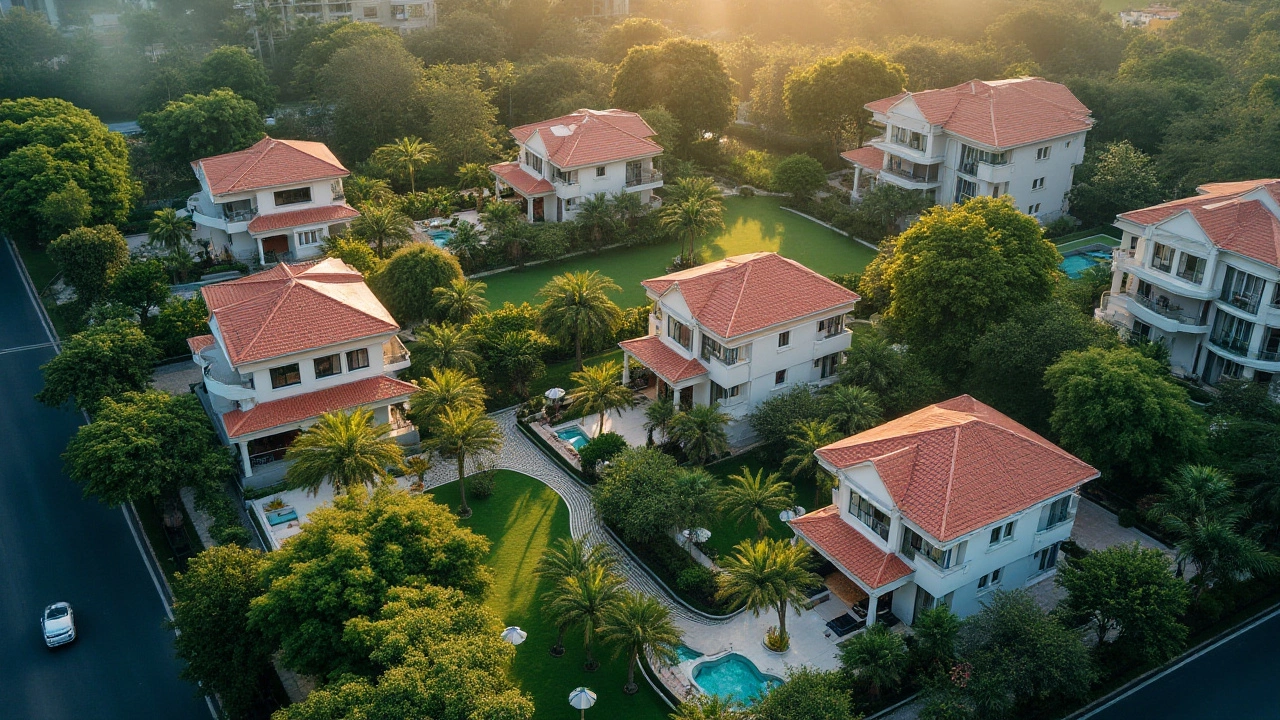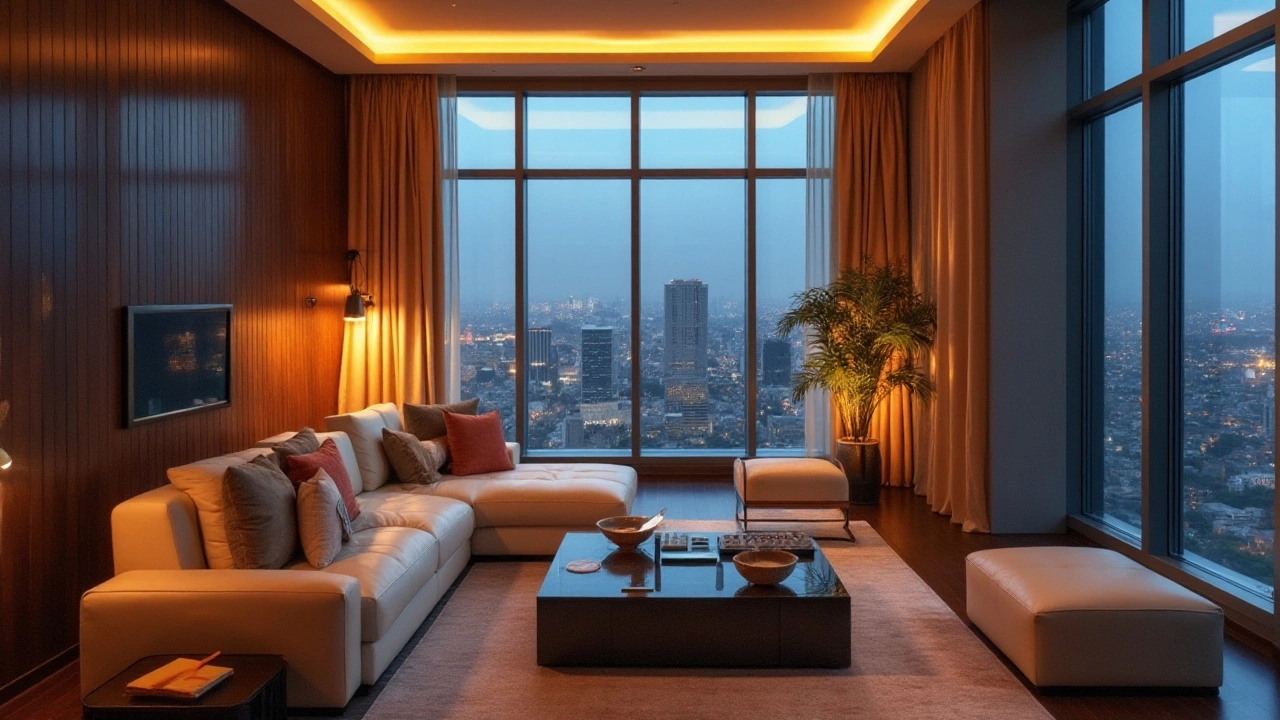In the world of high-net-worth individuals, where options abound, an intriguing pattern is emerging: wealthy people choosing to rent their homes. This choice often raises eyebrows, as one might assume that unlimited resources would naturally lead to ownership of lavish estates. However, delving deeper, a picture unfolds of a lifestyle where flexibility is king, allowing the affluent to navigate their options in a dynamic world.
As the luxury rental market flourishes, many are drawn to the appealing combination of high-end amenities and the freedom from the chains of ownership. It's not just about having a roof over one's head; it's about having the agility to respond to investment opportunities and lifestyle changes without being anchored down by real estate obligations.
- Renting for Flexibility
- The Appeal of High-End Rentals
- Investment Strategies of the Wealthy
- Lifestyle Trends and Preferences
- The Role of Mobility
- Future of Luxury Real Estate
Renting for Flexibility
For many affluent individuals, the allure of renting lies in the unmatched flexibility it offers. In a fast-paced world where opportunities arise spontaneously, being tied to a property can be more of a burden than a boon. Renting allows wealthy individuals to pivot quickly, relocate for new ventures, or simply change their surroundings to suit their desires without the cumbersome process of selling a home. This is a significant consideration for those who are constantly on the move, whether for business or personal reasons.
Rich people renting high-end properties often have a network of residences across the globe. By renting, they can afford the luxurious experience of maintaining residences in multiple cities without the added strain of property maintenance and management. This trend supports the idea of a global lifestyle, enabling them to stay wherever the wind of opportunity blows. Renting also precludes the need to understand and navigate varying real estate markets in each location, saving time and resources.
The statistics paint an enlightening picture. According to a recent survey conducted by Knight Frank, about 30% of high-net-worth individuals prefer renting over owning their primary residence. This percentage underscores a shift in mindset where lifestyle choices are prioritized over traditional ownership. The high-end rental market offers opulent options, with properties boasting impeccable design, state-of-the-art facilities, and concierge services that rival five-star hotels—appealing even to the most discerning tastes.
Consider the insights from real estate strategist Alex Carter, who notes, "Renting provides the option to live luxuriously without the perpetual commitment and baggage of ownership. It's about experiencing life to the fullest, unanchored, and free to explore the world's best options." This quote highlights the deeply personal reasons some choose to rent, reflecting a new definition of what 'home' means.
Moreover, the financial aspect cannot be overlooked. By renting, wealthy individuals can keep their liquid assets more accessible, allowing for swift investments or business ventures that require immediate capital availability. For investors, this mobility is critical for seizing strategically advantageous positions in highly volatile markets.
A closer look at market data reveals that the demand for ultra-luxury rentals has increased by approximately 15% over the past few years. This increase showcases a growing appetite for homes that meld opulence with freedom. Naming high-profile celebrities and entrepreneurs who've embraced this trend, like Tom Brady or Elon Musk, provides tangible examples of this wider shift among the elite.
In many ways, the choice to rent is not about necessity but about the power of possibility. As lifestyles continue to evolve rapidly, renting will likely become even more ingrained in the tapestry of high-end living. The option to pack up and move on a whim, whether to follow the sun or the next big project, remains an enticing promise reserved for those who can afford the privilege. As the global landscape shifts, so too does the definition of 'home' for the world's affluent citizens.
The Appeal of High-End Rentals
The decision for wealthy individuals to rent rather than buy is more than just a financial option; it represents a conscious embrace of a lifestyle that prizes freedom and adaptability. High-end rentals offer a world of options complete with luxury amenities such as state-of-the-art gyms, infinity pools, and concierge services that are often comparable to – or even surpass – those found in privately owned properties. For those who thrive on variety and novelty, the ability to experience different properties without the long-term commitment of ownership is particularly alluring.
Renting a luxury property allows the affluent to try out different neighborhoods and cities across the globe, offering them a dynamic lifestyle that can evolve with their personal and professional lives. This flexibility is invaluable for those whose careers might have them switching locations frequently, such as CEOs or international entrepreneurs. They can indulge in the uniqueness of different environments, from a penthouse in New York City to a villa on the French Riviera, without being tied down by property logistics.
As real estate expert and author Barbara Corcoran once pointed out, "In wealth, flexibility is not just a privilege but a means to seize new opportunities as they arise." This mindset is particularly pertinent in the current era, where remote work and digital nomadism are on the rise, influencing even those traditionally tied to a single location.
An additional factor contributing to the appeal of high-end rentals is the opportunity cost of capital. Wealthy individuals often see their money as a tool for generating more wealth. By opting not to lock up substantial funds in real estate purchases, they can direct their capital towards potentially higher-yield investments, such as stocks or new business ventures, which could offer greater returns in a shorter timeframe. In essence, the rental fee becomes a calculated expense in exchange for broader financial flexibility and enhanced liquidity.
For the environmentally or socially conscious elite, the appeal of renting can also lie in their ability to engage in a more sustainable lifestyle. By choosing rentals with cutting-edge eco-friendly technologies or in communities that prioritize social responsibility, they align their living situation with their personal values. This adaptability in housing reflects a modern mindset where living arrangements are not just about status but also about making conscientious choices that match one's evolving beliefs and priorities.
It's clear that the motivations for choosing high-end rentals are as varied as the individuals themselves, but what unites them is a shared value of lifestyle quality, flexibility, and financial stewardship. With the landscape of how we work and live continuing to evolve, it's likely that these trends will become even more pronounced in the coming years, challenging traditional notions of home ownership at the top end of the market.
Luxury rental market opportunities are also prevalent due to demographic changes and global economic conditions. The post-pandemic era, with its shifting work paradigms and increasing mobility, has catalyzed a significant shift in how affluent populations view personal space and residency. Adapting to current trends not only demonstrates spontaneity and adventure but also a strategic consideration of personal and business dynamics in an interconnected world.

Investment Strategies of the Wealthy
In the intricate world of high finance, rich people often adopt unique investment strategies to expand and safeguard their wealth. For many of these affluent individuals, renting homes rather than buying forms a crucial part of this strategy. This decision provides a level of financial liquidity that allows them to seize investment opportunities with swift agility. Unlike traditional homeowners who might find their assets tied up in real estate, wealthy renters can allocate funds more dynamically.
The flexibility afforded by this choice lets them keep their capital free for investments that promise higher returns. Imagine being able to swiftly pivot financial resources into a booming market, or a lucrative startup, without having to spend time and money liquidating a real estate asset. High-net-worth individuals are adept at such maneuvers, always on the lookout for the next big opportunity. A rented home doesn't anchor them in one place or one investment, allowing for a portfolio that can be diverse and ever-adaptive to changing economic landscapes.
In this realm of wealth management, risk mitigation takes different forms than the average person's approach. For instance, real estate upkeep and associated costs can prove burdensome, even on luxury properties. By renting, these costs remain the landlord's responsibility, not the tenant’s, freeing up funds for potentially lucrative ventures. A key perspective shared by many rich renters is viewing housing as a depreciating cost of living, rather than an appreciating asset, hence prioritizing investments elsewhere.
"By keeping our options open and properties unattached, we can focus more on our business venture without the burden," says renowned entrepreneur and investor, James Altucher, highlighting a common sentiment among high-net-worth investors.
Moreover, many wealthy individuals are opting to leverage rental agreements as a strategic move, especially in fluctuating markets. They avoid committing to properties that could devalue, opting instead to channel their financial prowess into stocks, bonds, emerging markets, and more speculative investments. This strategy isn't just about safeguarding wealth, it's about aggressively expanding it in directions one could not predict when tied to a single property.
The Role of Financial Advisors
Financial advisors play a pivotal role in shaping these strategies, offering insights that inform their clients' decisions on when to invest in bricks and mortar and when to maintain flexibility. With advice grounded in market analytics and trends, these advisors help outline diversified portfolios. Data-driven decisions guide these wealthy individuals, who continually assess the best avenues for their wealth, often opting for rental properties that provide maximum personal satisfaction without long-term commitment.
As we observe this shift in the real estate market, it's clear that the decision for even the wealthiest to rent rather than buy reflects a broader strategy in managing substantial wealth. It's less about the reluctance to own property, and more about prioritizing the growth of their financial empire. With a combination of astute advisory and aggressive management, this approach often leads to grander riches, achieved with the wisdom to see beyond the immediate allure of owning a luxury estate.
Lifestyle Trends and Preferences
Exploring the lifestyle trends among the affluent that contribute to their decision to rent reveals fascinating insights into contemporary living preferences. In a world that values experience over possession, many wealthy individuals are opting to rent high-end homes as a reflection of their lifestyle aspirations. Renting offers an opportunity to live transiently in the most desirable locations, shifting seamlessly from a chic New York penthouse to a sun-drenched Malibu villa, without the burdens of ownership. This trend signifies a broader cultural shift towards valuing experiences, where the luxury rental market provides the flexibility needed for spontaneous lifestyle changes.
An increasing desire for personalization in living arrangements is also a driving factor. Rather than being tied down to one property, renting lets individuals tailor their living situations to fit distinct phases of their lives. This is particularly appealing for those who travel frequently for business or leisure, allowing them to maintain residences in multiple prime locations. A part of this attraction is the ease with which tenants can upgrade to units featuring the latest in cutting-edge technology and amenities, which is more efficient than renovating owned properties.
The evolving attitudes towards property reflect a growing recognition that wealth extends beyond the tangible. A distinct advantage of renting is the ability to diversify investments, focusing capital not on depreciating assets, but on ventures and opportunities that generate greater financial returns. These individuals are redefining what it means to live luxuriously. As American entrepreneur Mark Cuban once stated,
"The most valuable assets you can acquire aren't tangible, but rather experiences that enrich your life."Such statements resonate profoundly with this new-age affluent, driving a lifestyle that prizes adaptability and capital fluidity.
For many wealthy renters, the move is more than just about financial prudence; it's about being part of a growing community of like-minded individuals seeking to explore new horizons. The social landscape of luxury rentals offers opportunities to mingle with peers who share similar interests and ambitions, creating an environment that is both exclusive and enriching. This underscores the importance of not just where they live, but how they live, choosing environments that nurture their aspirations and inspire creativity.
This pattern is supported by data from real estate analytics firms indicating a steady rise in high-end rental transactions over the past decade. According to a report by a leading real estate company, the number of leased properties valued at over a million dollars grew by 15% last year alone, highlighting the increasing demand in this sector. Such numbers hint at a robust shift in the lifestyle ethos of high-net-worth individuals, reshaping the very fabric of luxury real estate itself.

The Role of Mobility
In a rapidly changing world, the concept of home is no longer as static as it once was, especially for the wealthy. The role of mobility in the lifestyle choices of affluent individuals cannot be understated. These individuals live in a world constantly in flux, where opportunities for business, exploration, and cultural experiences are boundless. For them, renting makes perfect sense because it provides a level of flexibility and freedom that homeownership does not. Imagine a high-net-worth executive who frequently jets off to different countries for extended periods. A permanent residence would be more of a burden than a benefit.
Mobility allows these financially fortunate individuals to tailor their living arrangements to their immediate needs and desires. It's akin to having various luxury hotel options at your disposal, each ready to welcome you with open arms and provide a short-term abode filled with comforts. An intriguing market insight reveals that many of these wealthy renters prioritize proximity to core business or cultural hubs. Whether it's a penthouse in Manhattan or a beachfront villa in the South of France, these individuals seek strategic locations that amplify their social and professional lives. The benefit is evident; they can easily transition between cities, sidestepping the complexities of owning multiple properties and dealing with varied regional market fluctuations.
If you can pay for the liberty of intentional impermanence, why wouldn't you? Many wealthy individuals, like Warren Buffet, see value in flexibility and choose not to tether themselves unnecessarily.
The choice to rent also intersects with other aspects beyond just the business considerations. There's a rising emphasis on experiences over possessions. The rich value the ability to experience life in different geographies, climates, and cultures with ease. For them, having properties tied down requires maintenance, attention, and finances that they would rather deploy elsewhere. While they stay in a rented villa, the chances are they are already eyeing the next destination to encapsulate a unique cultural immersion.
Statistics Highlighting Wealthy Mobility
Data from the Global Wealth Migration Review suggest that each year, thousands of millionaires move to different countries with high personal tax benefits and lower living costs. Interestingly, a report by Knight Frank highlights that high-investment rental properties have seen a 12% rise in occupancy over the last few years, indicating a clear trend toward rental preferences among the affluent.
- Percent of Ultra-High Net Worth Individuals living in rented accommodations continues to rise.
- The value of the global luxury rental market is projected to grow by 20% by 2027.
Future of Luxury Real Estate
As the real estate industry experiences shifts, the luxury rental market stands poised for a dynamic transformation, reflecting the broader changes in how wealthy individuals approach home life. Unlike traditional real estate purchases, which often lock buyers into decades of commitment, the rental model provides the affluent a level of mobility and flexibility that aligns with their fast-paced lifestyles. In recent years, luxury properties have evolved from static investments into adaptable and experiential living spaces. This shift is powered by a younger generation of affluent individuals who prize experiences over possessions—a trend that is anticipated to only grow in influence.
Developers and landlords are recognizing the demands of this new market by creating rental homes that rival any bought property, often outfitted with exquisite designs, state-of-the-art technology, and premium services right at the fingertip. The focus on customer experience within rentals is transforming expectations. High-net-worth individuals are no longer just looking for a place; they're seeking an immersive lifestyle package that may include concierge services, membership to exclusive clubs, or even private yachts and jets at their disposal.
Experts note that this transformative wave might reshape the very landscapes of cities. “The luxury rental market is redefining urban living, allowing for a more fluid relationship with place and investment,” noted MaryAnne Murphy, a leading real estate analyst.
"Rich people renting is not just a temporary solution or a recession-driven decision—it is becoming a preferred choice because it aligns seamlessly with a world that values flexibility over roots."This depth of choice and personalization serves to enhance the desirability of rental options amongst the wealthy, creating a burgeoning market with unique demands.
In looking to the future, it becomes evident that the luxury rental market will likely influence the broader real estate trends. As more developers focus on creating exclusive rental communities, there might emerge innovative urban spaces solely designed for the affluent rental market. These could not only serve as investments but also as cultural hubs fostering community among like-minded individuals. While such trends depend heavily on economic circumstances and regional demand, many in the industry foresee a continued rise in the popularity of luxury rentals, moving beyond temporary lodgings into spaces that define new dwelling paradigms. The future of luxury real estate, therefore, appears to be one of fluidity, focused on the ever-evolving desires and needs of the elite clientele.

